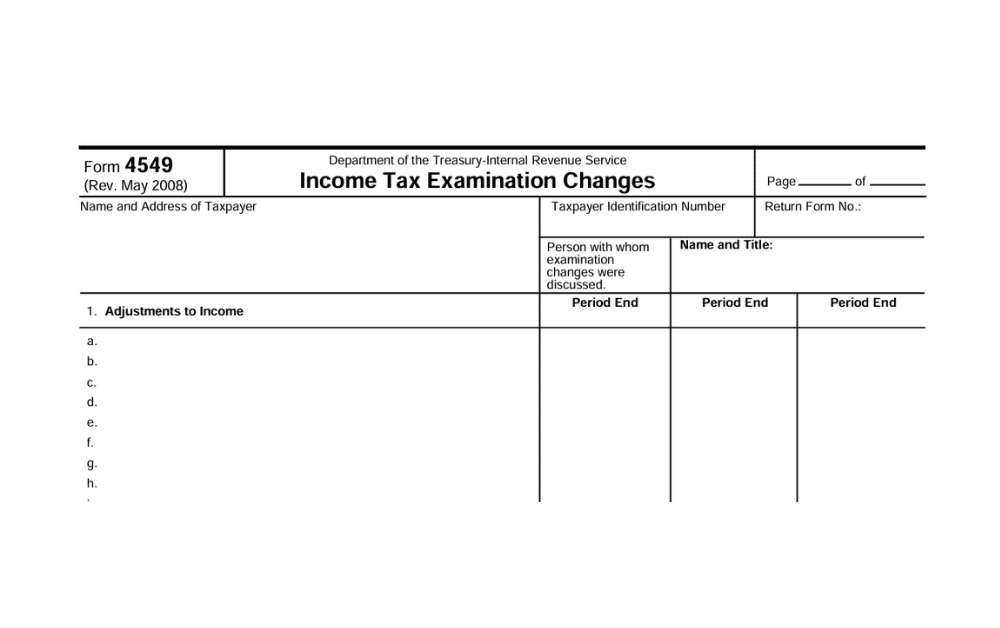IRS Form 4549: What to Do After an Audit

The IRS conducts thousands of audits each year to verify the income and expenses claimed on tax returns, and Form 4549 is the document used to communicate proposed changes after completing an examination. If you’ve received this form in the mail, you’re probably feeling concerned about what it means for your tax situation.
Form 4549 is simply a summary of proposed changes to your tax return that includes penalties and interest determined as a result of the audit. The keyword here is “proposed.” Nothing is final until you either agree to the changes or exhaust your appeal options. Whether you’re behind on filing, recently moved abroad, or just caught the IRS’s attention, you have clear rights and options for responding to this form.
In this article, we’ll walk you through exactly what Form 4549 means, your response options, important deadlines, and how to challenge the IRS’s findings if you disagree.
What Is IRS Form 4549?
IRS Form 4549 is the Income Tax Examination Changes Letter that includes a summary of the proposed changes to your tax return, penalties, and interest determined as a result of the audit. This form arrives after the IRS completes its examination of your return and proposes adjustments to what you originally filed.
Form 4549 typically includes a summary of proposed changes, a detailed explanation of each adjustment, a tax computation showing additional taxes or refunds due, and clear response options for agreeing or disagreeing with the findings.
Why Did I Receive Form 4549?
You might receive Form 4549 after an audit or examination of your tax return, which can occur for several reasons, including discrepancies in reported income, excessive deductions, or random selection. For expats specifically, common audit triggers include:
- Claiming the Foreign Earned Income Exclusion without proper documentation of the Physical Presence Test or Bona Fide Residence Test
- Discrepancies between the foreign income reported and the information the IRS receives from third parties
- Large deductions or credits that seem inconsistent with reported income
- Failure to report foreign bank accounts or foreign assets
- Missing or incomplete Foreign Tax Credit documentation
The IRS may also conduct a correspondence audit, which involves examining a few potential issues in a tax return. Alternatively, taxpayers may be identified by the Automated Underreporter function, which compares information provided to forms submitted by third parties.
What Are My Response Options?
When you receive Form 4549, you have several paths forward depending on whether you agree with the IRS’s findings.
Option 1: Agree with the Proposed Changes
Signing Form 4549 is an acknowledgment that you agree with the IRS’s findings and adjustments. If the proposed changes are accurate and the amounts owed are manageable, you can sign and return the form with payment. Please note that accepting Form 4549 also implies acceptance of all associated penalties and interest.
To agree, sign, and date Form 4549, return it in the envelope provided, and make arrangements to pay the amount owed.
Option 2: Request a Conference with an IRS Manager
You’re entitled to discuss the audit findings with an IRS manager in what’s known as a supervisory conference, where you may freely state the nature of your dispute with the findings. This informal option can sometimes resolve issues without the need for formal appeals.
Option 3: File an Appeal Using Form 12203
If you disagree with proposed adjustments of $25,000 or less per tax period, you can submit Form 12203, Request for Appeals Review, to have your case reviewed by the IRS Independent Office of Appeals.
For appeals, complete Form 12203 within 30 days of the date on your Form 4549, clearly identify which adjustments you dispute, and explain why. The IRS Independent Office of Appeals is independent of the IRS office proposing the action you disagree with, and appeals conferences are conducted in an informal manner where most differences are settled without expensive and time-consuming court trials.
Option 4: Request Audit Reconsideration Using Form 12661
If you disagree with a tax assessment and have new information to provide the IRS as to why you disagree, you can submit IRS Form 12661, Disputed Issue Verification, to request audit reconsideration.
Audit reconsideration is appropriate when you didn’t participate in the original audit or missed correspondence, have new documentation that wasn’t available during the audit, believe there were computational errors in the IRS assessment, or disagree with adjustments and have evidence to support your position.
You cannot use Form 12661 if you’ve already signed a closing agreement (Form 906), entered into an offer in compromise, or if a court has already issued a final determination about the tax assessment you’re trying to challenge.
Option 5: Do Nothing (Not Recommended)
Failing to respond to Form 4549 can result in automatic IRS enforcement actions, including the placement of federal tax liens on your property or the levying of your bank accounts and wages. If you do not sign Form 4549, the IRS will send you a Notice of Deficiency, which will provide you 90 days (150 days if you are outside the U.S.) to respond by petitioning the Tax Court.
What Deadlines Do I Need to Know?
For expats, the timelines are critical. The response deadline for Form 4549 is typically 30 days. Use this time to review the findings, gather documentation, and decide your course of action.
If you don’t respond or don’t sign Form 4549, the IRS will issue a Notice of Deficiency (also called a 90-day letter) giving you 90 days to petition the U.S. Tax Court if you’re in the United States, or 150 days if you’re outside the United States. This is a critical deadline that cannot be extended.
To petition the Tax Court, you must send your petition to the United States Tax Court (not the IRS) within the 90-day or 150-day period shown on your notice. You should expect to hear from the IRS regarding your reconsideration request within 30 days after submission.
How Do I Challenge Form 4549 Findings?
If you disagree with the IRS’s proposed changes, here’s how to build a strong response.
Gather Supporting Documentation
Documentation to contest adjustments could include receipts and invoices to substantiate expenses or deductions, bank statements to verify income amounts or transaction timing, employment records such as W-2s or 1099 forms that might have been missed or incorrectly reported by employers, and correspondence, including any relevant communication that supports your case.
For expats, this may also include proof of foreign residence or physical presence (such as lease agreements, utility bills, or employment contracts), foreign tax returns and proof of taxes paid to foreign governments, foreign bank statements showing income sources, and documentation of the qualifying days spent outside the U.S.
Complete the Appropriate Form
Form 12203 requires you to identify the items you disagree with in the proposed changes, tell the IRS why you disagree, and can be used for proposed adjustments of $25,000 or less per tax period. For disputes over $25,000 per tax period, you’ll need to file a formal written protest instead.
For audit reconsideration, complete a separate block for each issue or adjustment with which you disagree on Form 12661, and attach photocopies of supporting information for each issue.
Submit Everything Properly
Mail your appeal or reconsideration request to the address shown on your Form 4549 or IRS correspondence. Use certified mail with a return receipt to confirm delivery and retain copies of all submissions.
What Happens After I Respond?
The outcome depends on which response path you choose.
If you agree, the IRS will finalize the assessment and send you a bill. You can pay in full or set up a payment plan.
If you appeal, the IRS Office of Appeals will review the case and determine whether to uphold, modify, or reverse the audit adjustments. This process can take weeks to months, depending on the complexity of the dispute. The assigned appeals officer will evaluate both your documentation and the IRS’s position.
If you request reconsideration, the IRS will review your new information and either accept your position (reducing or eliminating the assessment), accept it in part, or maintain its original determination.
If you petition the Tax Court, your case will be heard before a Tax Court judge who will make a binding determination.
What Mistakes Should I Avoid?
- Missing deadlines is the most critical mistake: The 30-day response window for Form 4549 and especially the 90-day or 150-day deadline for Tax Court petitions cannot be extended. Please note these dates immediately upon receiving the form.
- Don’t resubmit old information: Some taxpayers may be tempted to use the audit reconsideration process to rehash previously made arguments with the IRS; however, audit reconsideration requires new information that wasn’t considered during the original examination.
- Professional help matters: Form 4549 represents a critical juncture in your tax situation. The complexity of expat taxes combined with audit procedures makes professional representation valuable, especially for disputes over $10,000.
- Never ignore the form: Hoping it will go away only leads to escalating enforcement actions, including liens, levies, and wage garnishment.
Can I Fix Past Filing Mistakes?
If you’re behind on filing or discover you’ve missed reporting requirements, the Streamlined Filing Procedures offer a penalty-free way to catch up. This IRS amnesty program allows eligible taxpayers to file the last three years of returns and six years of FBARs without penalties, as long as their failure to file was non-willful.
Many expats who receive Form 4549 discover other compliance gaps during the process. Keeping up with all your filing obligations protects you from future enforcement actions.
How Greenback Can Help
Receiving Form 4549 doesn’t mean you’re out of options. Many proposed adjustments can be reduced or eliminated with proper documentation and expert representation.
If you’ve received Form 4549 and need help, contact us today. One of our Customer Champions will gladly help assess your situation and match you with the right accountant. No matter how late, messy, or complex your return may be, we can help. You’ll have peace of mind, knowing that your response was handled right.
Whether you’re years behind or just unsure about the thresholds, our team is ready to help.
Disclaimer: This article is for informational purposes only and does not constitute tax, legal, or accounting advice. The information provided may not apply to your specific situation, and tax laws and regulations change frequently. For advice specific to your circumstances, please consult with a qualified tax professional.


